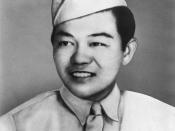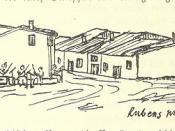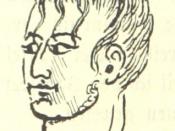"Snow Falling On Cedars"ÃÂ by David Guterson is a novel set during the World War II era of a childhood romance between a white boy and a Japanese girl, a man who is accused of murder, and a community that is torn by prejudice. The story takes place in San Piedro Island, Washington where it is mainly populated by Japanese and American fishermen and farmers. The beginning of World War II brings panic to all of San Piedro Island as the Japanese community is deported to internment camps. In the meantime the Island's view of Japanese people suddenly is altered and conflicts arise. This is a story of lost love, murder, pride, and social injustice.
The story revolves around the lives of three main characters, Hatsue Imada, Ishmael Chambers, and Kabuo Miyamoto all who are tied together one way or another. Hatsue Imada, the wife of Kabuo Miyamoto, shares recollections of her early life and childhood love Ishmael Chambers.
Ishmael, a local reporter for his father's newspaper, covers the events of the trial while trying to relive a memory of his youth. Kabuo Miyamoto, the man on trial for murder, seeks justice and tries to prove his innocence. These three who have grown up on the island share mental and physical scars as a result of World War II. It is eight years after the war and novel begins with the trial of Kabuo Miyamoto who is accused with the murder of Carl Heine, a local fisherman.
On the morning of September 16 Carl Heine's boat, Susan Marie, is discovered floating in the bay by the county sheriff and his deputy. The sheriff is suspicious of the neat manner the boat is left in and decides they should bring in the net that was left out in the water. As the sheriff and the deputy pull in the net the face of Carl Heine appears and they are astonished. The two draw the corpse into the boat and simply stood there staring at the body. This tragedy is marked as a mysterious drowning, however when the island's coroner exams the body of the deceased, he finds that Carl Heine did not go into the water breathing. The coroner discovers a wound on the body's ear which looks like what he describes could possibly inflicted by someone who is skilled with the Japanese art of Kendo, or stick fighting. More suspicions arise when Kabuo Miyamoto was found to have been the last person to see Carl Heine before his untimely death, and an assumption is made linking the wound on Carl Heine's ear to Kabuo Miyamoto.
Long before the divergence of the community, there was a simplicity and innocence within the adolescence. A friendship between two teens Ishmael Chambers and Hatsue Imada buds into a love that society forbids. While growing up Ishmael and Hatsue escaped to the cedar trees to secretly absorb in one another's bodies, share dreams, and tell each other's secrets, however this did not last very long. On December 7, 1941, Pearl Harbor was bombed. News of this catastrophe spread a fear throughout the island of the Japanese community and prejudices arose out of this fear. Japanese were arrested because of the possibility of spying for Japan or the betrayal of the Americans. FBI searched many Japanese homes for illegal contraband. All of these events during World War II led to the relocation of all Japanese living in the western part of the United States to internment camps as an attempt to maintain national security. During the imprisonment Hatsue and Kabuo cross paths, although they are from the same town they meet each other for the first time under unfortunate circumstances. Hatsue and Kabuo later wed. As for Ishmael, he is recruited and trained to fight in the military against the Japanese. Ishmael becomes angry towards Hatsue and in fact he has hatred for all Japanese.
Eight years have passed on the island of San Piedro nonetheless the bigotry still remains. The war is over and everyone is sent home to return to ordinary life as if nothing happened, however it has left unwanted memories and scars on many people's lives. A dispute between two families over land turns into accusations of murder. Although Kabuo Miyamoto proclaims his innocence he is still tried for murder because of his ethnicity. The story concludes with the verdict of not guilty through the help of Ishmael Chambers. Ishmael reluctantly puts aside his past and uncovers the truth to save Kabuo.
The main social issue of this novel is the unjustifiable imprisonment of the Japanese people during World War II. If we view this issue in a sociological standpoint, there are three different ways it may be approached. Reading this novel with a functionalist perspective in mind, a person may agree with how the United States handled the issue. In order to maintain a secure nation at war, a social consensus at that time believed the country must ostracize all Japanese and people of Japanese decent. The bombing of Pearl Harbor stir a panic across the country and the United States had to keep the country stable by any means necessary. The country's main objective for the expulsion was rooted from fear of espionage, disruption, and injustice against Japanese and Japanese-Americans. It was rooted as well from the long historic prejudice against Asians, dating back to the Chinese railroad workers in the 1800s. A conflict theorist will agree with a functionalist as well in this case. According to a conflict perspective social order is maintained by the strong having power upon the weak, a conflict between two unequal groups. In this case the weak are the Japanese who are dehumanized by being imprisoned by law solely based on their ethnicity. Looking through the eyes of a symbolic interactionist, I believe a resolution could have been negotiated. If two representatives from both groups were to come together to discuss the issue and come to a common ground, the outcome would have not been so devastating.
In my judgment I think the way this country handled itself was appalling. To exile a person unwillingly, based on an ascribed status something beyond their control, is inexcusable. Yes, there may have been a widespread fear of disloyal Japanese living in the United States, however I believe the country should have allowed all the Japanese in the United States to stay in their homes and any illegal activity to be investigated and tried in court like any other crime committed. In result of this horrific event in history there are many families of Japanese decent living in the United States that are carrying memories of World War II and is scarred by the injustice this country has laid upon them.





